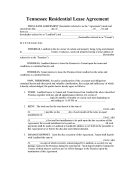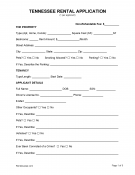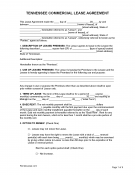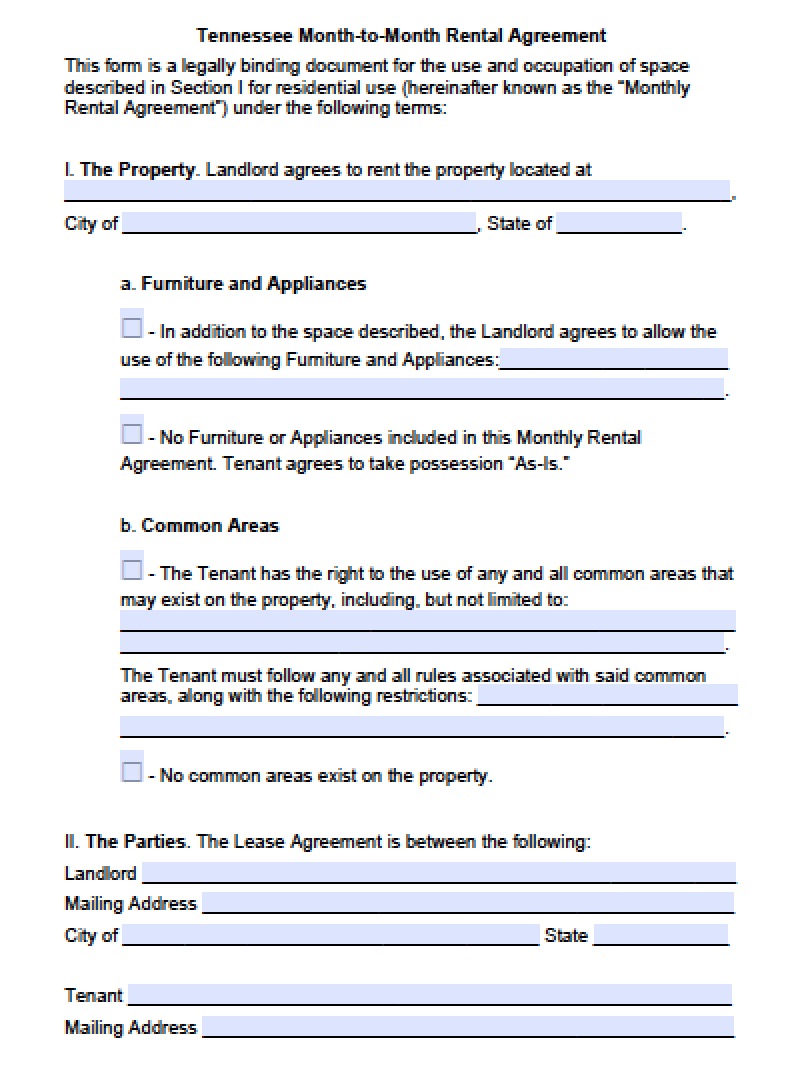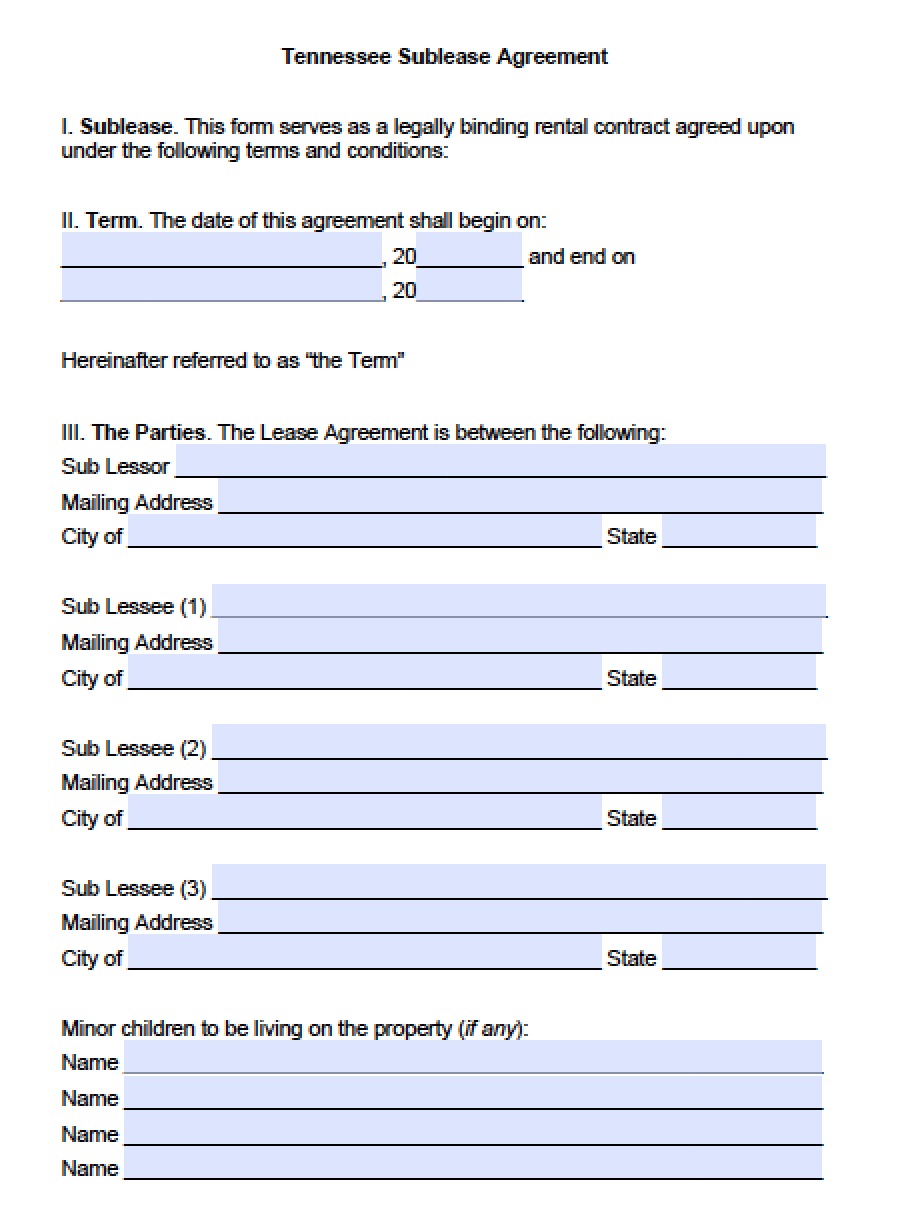The Tennessee rental lease agreements are used to create a binding contract between a landlord/property manager and an individual/business/entity seeking to rent residential or commercial property. All agreements must follow State laws (Title 66 – Chapter 28) and both parties must abide by the terms set forth therein or face monetary damages and/or legal consequences. A rental application form is included in this list of rental forms; landlords would be wise to use them to vet potential tenants before agreeing to lease property. Upon signature by tenant and landlord (or authorized representative), the form becomes legally binding and the tenant shall be granted access to the premises.
Tennessee Rental Lease Agreement Templates | PDF
Tennessee Lease Agreements
The Tennessee standard residential lease agreement is a contract used by a property owner/manager and a tenant who wish to come to a mutually beneficial arrangement regarding the renting of residential property. The terms and conditions include rent amount, payment date, utilities, and other expenses, security deposit, termination conditions, and rights and responsibilities of both parties. Once the tenant and landlord are satisfied with the written arrangement, they can sign the document and it becomes legally binding. It’s important to…
The Tennessee rental application is a document used by a landlord to screen a prospective tenant before signing a rental agreement. The application allows the landlord to check the person’s background, their credit history, their rental history, and current and past employment. A landlord will often have many applicants for a particular residential rental property. Once they have selected the best candidate, they can then present them with a standard residential lease agreement or a month-to-month lease agreement. Furthermore, regardless…
A Tennessee 14 (fourteen) day notice to quit is a form that is used to notify a tenant that they have defaulted in their rent payment as per the lease agreement. When a tenant fails to pay rent, the nonpayment notice will be delivered to them and they will have fourteen (14) days from the notice delivery date to remedy the situation. If said tenant fails to pay within that time frame, they will have to vacate on the 15th…
A Tennessee commercial lease agreement is a document that is negotiated between a property owner of retail, office, or industrial space and a business tenant acting as an individual or entity. Before an agreement is presented, the property owner/manager will check the background of the business to make sure they are in good standing. Once the entity has been vetted, the parties must come to an agreement regarding rent payment (payment amount and date), utilities and other expenses, landlord and…
The Tennessee month-to-month lease agreement is a residential rental contract between a landlord and tenant that does not have a fixed end-date. All the other elements of a residential rental agreement remain the same, such as the rights, responsibilities, and obligations of both parties and the applicability of State laws. This temporary arrangement makes it easier for both parties to terminate without much cause; however, certain conditions apply (mentioned below). It is highly recommended that the landlord verify the tenant’s information…
The Tennessee sublease agreement is a rental form used by a tenant to sign over a portion or the entirety of their residential rental space to another individual. This type of arrangement must be presented to the property owner or landlord before any agreement is signed. The tenant renting out their space (sublessor) might want to have the prospective new tenant (sublessee) fill out a rental application form before presenting a sublease agreement. If anything happens to the property and…
STATE DISCLOSURES
Commercial
Disclosure (§ 66-7-108) – If the commercial property space is one thousand five hundred square feet (1,500 sq. ft.) or less, and the industrial real property is five thousand square feet (5,000 sq. ft.) or less, the tenant may request from the landlord a statement detailing the compliance with local and State fire, plumbing, and electrical codes.
Residential
Address of Landlord or Agent (§ 66-28-302) – The lessor must provide the names and addresses of all parties authorized to manage and/or receive notices pertaining to the property.
Lead-Based Paint – Federal law requires that landlords of property built prior to 1978 must provide this disclosure statement to prospective tenants.
SECURITY DEPOSITS
Maximum (§ 66-28-301) – No maximum security deposit amount is mentioned in Tennessee security deposit statutes.
Returning (§ 66-28-301) – The landlord must give back any and all funds to the tenant within thirty (30) days of the tenant vacating or the agreement’s termination date. If the tenant does not provide a forwarding address within sixty (60) days, the landlord may keep any and all funds associated with the deposit.
LANDLORD’S ACCESS/ENTRY
There is no minimum notice required for a landlord to access the property rented to a tenant, although twenty-four (24) hours is standard (§ 66-28-403).

